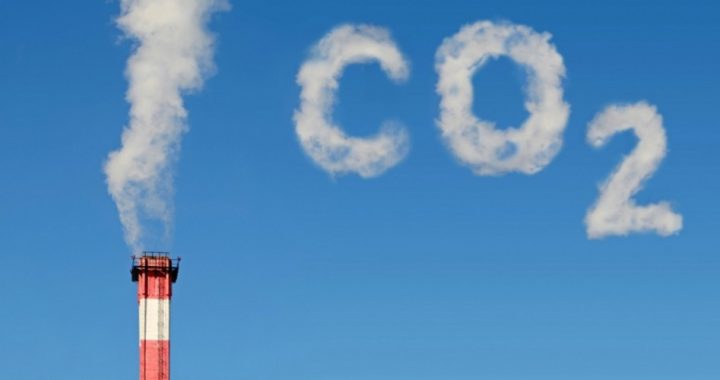
Professor Andy Ridgwell, a research fellow at the School of Geographical Sciences at the University of Bristol, England, has co-authored a new study released on March 21 claiming that humans are releasing carbon into the atmosphere ten times faster than during any period of natural global warming in the last 66 million years.
Ridgwell was one of three researchers engaged in the work, the others being James Zachos of the University of California at Santa Cruz, and lead author Richard Zeebe from the University of Hawaii.
In a summary of the report, AFP pointed to a previous period that experienced rapid global warming — called the Palaeocene-Eocene Thermal Maximum (PETM) — when the Earth’s surface temperatures climbed by more than five degrees Celsius (nine degrees Fahrenheit) within a few thousand years. The report went on to note that “current climate change over the last two centuries — mostly the last 50 years,” has amounted to 1°C (1.8°F) of warming “so far,” suggesting that the warming has not ended.
Though volumes of well-documented scientific evidence dispute such claims of recent warming, the report repeated the widely disseminated assertion that recent increases in global temperatures have “already begun to unleash super-charged hurricanes, storm surges boosted by rising seas and devastating drought.”
AFP reported that the PETM (though it was obviously a naturally occurring period of global warming) has been heavily studied and used as a stand-in for “the potential impacts of carbon pollution.” Theoretically, therefore, if catastrophic meteorological events resulted from the natural global warming, then similar events will result from so-called man-made global warming.
However, even the most ardent defenders of the man-made global warming theory do not claim to know what caused the natural rise in carbon levels in the atmosphere and rising global temperatures during the PETM period. An article published on the skepticalscience.com website (which seeks to debunk “global warming skeptics”), under a subheading, “No smoking gun,” admits:
Hundreds of scientific papers have been published on the PETM, but because of the scarcity of paleo-data from this time, there has been no clear scientific agreement over what initiated this warming, or where all the CO2 came from.
Among the possible cause offered are methane clathrates in deep sea sediments, volcanic activity disrupting organic sediments, and methane from permafrost on Antarctica, when it was much warmer than today.
When so little is known about what caused an increase in carbon in the atmosphere and warming temperatures eons ago, it seems illogical to use the PETM period as a guide to prove or disprove anything about global warming today, but that does not stop researchers such as those at the University of Bristol from trying.
“Of all the changes we have seen in 66 million years, [PETM] is the one that most looks like anthropogenic, or man-made, warming,” Ridgwell said to AFP.
This statement indicates that Ridgwell is a firm adherent to the theory that the earth’s climate has not only warmed in recent decades, but that such warming is anthropogenic, or man-made. Both of these claims have been disputed by many reputable experts in the fields of meteorology and related sciences.
Among these is Dr. Art Robinson, recipient of the Heartland Institute’s 2014 Voice of Reason Award, granted for his Global Warming Petition Project, which produced a petition signed by more than 31,000 U.S. scientists. The document reads, in part:
There is no convincing scientific evidence that human release of carbon dioxide, methane, or other greenhouse gases is causing or will, in the foreseeable future, cause catastrophic heating of the Earth’s atmosphere and disruption of the Earth’s climate. Moreover, there is substantial scientific evidence that increases in atmospheric carbon dioxide produce many beneficial effects upon the natural plant and animal environments of the Earth.
Among those agreeing with Robinson that carbon dioxide is beneficial is Dr. Richard S. Lindzen, emeritus professor of meteorology at MIT, who stated at a climate summit hosted by the Texas Public Policy Foundation last November: “Demonization of CO2 is irrational at best, and even modest warming is mostly beneficial.”
There are several factors indicating that the dire predictions that man-made carbon emissions are causing global warming — which will doom us all — are a cause of needless worry and overreaction on the part of government regulators. Not only is there little evidence that humans emit enough carbon into the atmosphere to have a noticeable effect on our weather, but there is evidence that global warming (whether one considers it to be manmade or natural) has ended in recent years. Additionally, there are scientists who maintain that CO2 — far from being harmful — is actually beneficial, especially to agriculture.
A report in Britain’s Daily Mail for October 2012 cited data on global temperature jointly issued by the U.K. government Met Office’s Hadley Centre and Professor Phil Jones, of the University of East Anglia’s Climatic Research Unit, showing that from the beginning of 1997 until August 2012 there was no discernible rise in aggregate global temperatures. A more recent report written by Lord Christopher Monckton for Climate Depot on March 4, 2014 indicated a continuation of this trend, with no global warming at all for 17 years and six months.
As for that devastating rise in atmospheric levels of CO2 that Ridgwell warned of, the Economic Times on March 18 cited a report issued by the International Energy Agency (IEA) in Paris on March 15 measuring CO2 emissions for 2015 at 32.1 billion tons, virtually the same as in 2014. This was the second year in a row when carbon emissions from energy related use stayed flat, noted ET.
“But what if these reports are wrong?” some steadfast global warming alarmists might ask. Even if they were, a March 16 report in The Scotsman, written by Dr. Keith P Dawson, vice president at the Scottish Society of Crop Research, suggests that the rise of CO2 in the atmosphere is beneficial. Dawson writes:
So CO2: Hero or Villain? A pollutant according to the US EPA or celebrated as Patrick Moore, GreenPeace founder, suggests? Without CO2 Life on Earth dies. Without CO2, no green plants, no grazing animals, food chain or humans, no wonderful nature documentaries!
Dawson acknowledges that our climate has changed over the centuries:
Let’s be clear: there is no such animal as a “Climate Change Denier” — who could deny impacts of climate change over millennia? Vikings cultivated Greenland, Romans tended Yorkshire grapes, even our glens testify to change — the only constant. Only flat-earthers deny change. The “denier” myth is a cynical activist construct to marginalize genuine questioning of the science, which should be welcomed.
That said, Dawson continues to tout the benefits derived from our present level of CO2 in the atmosphere, which he disputes is too high. He states:
It’s an undeniable fact that increasing CO2 increases plant growth. CO2 increases since 1985 have led to increased rainforest and crop growth, satellites show a 14 per cent increase in global greenery — fantastic news for nature and food security. Despite climate pessimists, global food prices remain low, with record yields achieved last year. Food prices would be even lower if the US ceased growing subsidized, inefficient “green” bioethanol crops. Extra production from rising “CO2 fertilization” is equivalent to an extra 15 per cent land globally.
The global-warming debate will not be settled anytime soon. However, in the meantime, a rational discussion of the several aspects of the debate, including whether the Earth’s mean temperature is rising, has ceased rising, or is in decline, would go a long way toward avoiding unnecessary hysteria and political repercussions. We may find that not only is it not necessary to place an economic burden on producers of carbon-based energy by regulating their activities, but that moderate carbon emissions may actually benefit agricultural production and our economy.
DOJ Has “Discussed” Referring “Climate Denial” Cases to the FBI
Global Warming Satellite Data Gets Suspicious Makeover
U.S. Science Teachers Disregard Unproven Global-warming Theory
Greenpeace Co-Founder: Climate Alarmists Would Kill Civilization
Supreme Court Stays EPA’s Enforcement of the Obama “Clean Power Plan”
Climate Costs Estimated at More Than $12 Trillion for U.S. Taxpayers
Asian Freeze Adds to Doubt on Reality of Global Warming
Massive Winter Storm Blows Cold Air on Alleged Global Warming
Hotter and Hotter? NASA and NOAA Claim Hottest Year Despite Evidence
2015: The Climate Record that Wasn’t
Shedding Light on the Global Green Agenda
Disarming the Alarmists: Climate-change Myth Takes Three More Hits
Climate Alarmists Have Been Wrong About Virtually Everything
Earth Is Cooling, Sea Levels Not Rising, Scientists Say
NASA Study Showing Massive Ice Growth Debunks UN Claims
Confab of Climate Experts to Challenge Global Warming “Consensus”
Was 2012 the Hottest Year? Alarmists Blowing Hot Air Again
Climate-change Computer Models Fail Again — and Again, and Again
Media Meltdown Over Antarctic Basin
Greenland’s Not-So-Rapidly Flowing Glaciers
Forget Global Warming; COLD Kills
Heat or Cold: Which Is More Deadly?
Global-warming Alarmism Dying a Slow Death
Arctic Ice Expanding, Not Retreating


